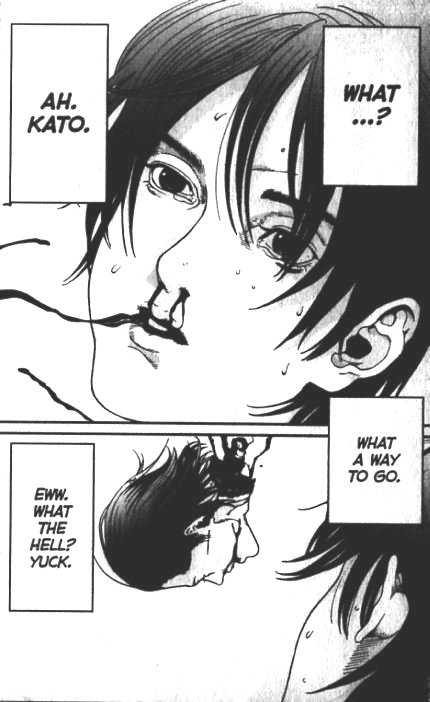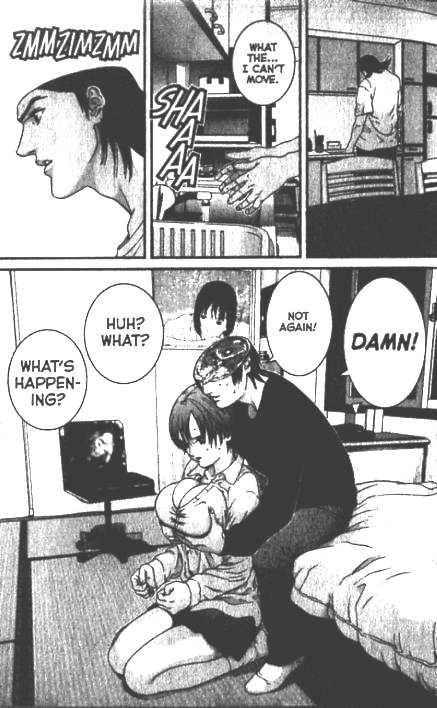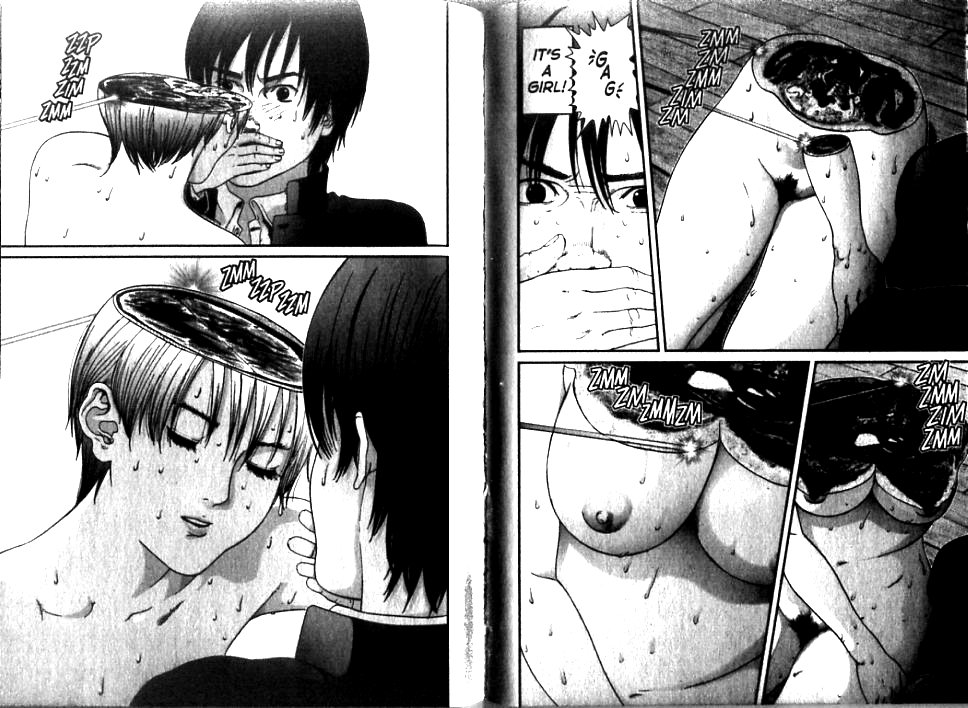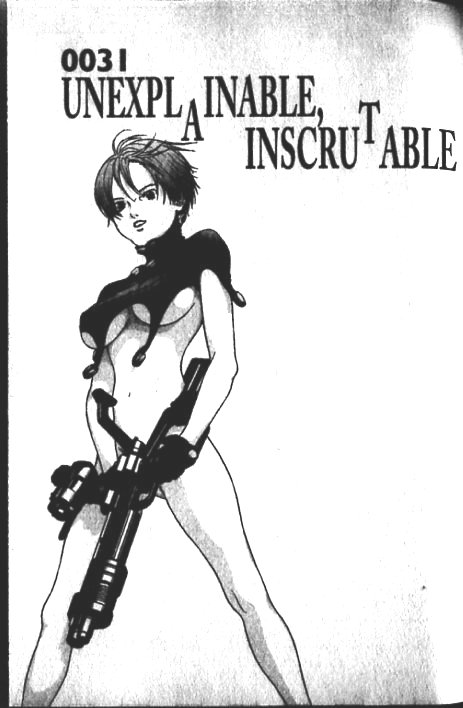In his review of Monster, Noah advises us that he would “rather pursue the trashier Gantz, which manages to be a lot more thoughtful and truthful about morality by the simple expedient of not idolizing its central characters.” Having read a few more volumes of the series, I would suggest that Noah mistakes base instincts, unfiltered onanism and self-indulgent stupidity for those more virtuous attributes.
That’s Suat, suggesting, in his sweetly understated way that I don’t know what I’m talking about.
So after reading the first 20 or so volumes of Hiroya Oku’s Gantz, have I seen the error of my ways? Well, not exactly.
Suat argues in his review that Gantz is bargain-basement wank material for clueless adolescents, composed of little more than pallid violence, pallid titillation, and pallid nihilism.
It would be easy to imagine this manga being put together by a bunch of sexually deprived nerds huddled around a computer screen but, no, I’m going to be kind here and just call them a group of over-sexed wankers. Gantz is clearly aimed at young males with a history of gaming, buying gravure idol magazines and indulging in H games. Nothing particularly unusual or pathetic here. Everyone can do with a bit of interactive porn now and then, but let’s not mistake this for great entertainment much less great art.
I wouldn’t call Gantz great art necessarily — I think I’m somewhat less interested in that kind of ranking than Suat is in any case. But at least in its early volumes, Gants does have a sense of pacing and atmosphere which I found compelling.
Tucker Stone gets at the book’s appeal a bit when he notes that:
Gantz is the true heir to Peter Parker, and… this–sleazy violence in Matrix jumpsuits–is where you turn if you’re looking for a contemporary Spider-Man comic. It’s 2010, and responsibility is an advertising tagline. Nowadays, a fresh-from-puberty kid with great power would use it to kill anybody that messed with him (every volume so far) and fuck Angelina Jolie (which he did in volume 8.)
For Tucker, this is, like Spider-Man and super-hero comics in general, a power fantasy — but a power fantasy pushed somewhere different than you usually find in super-hero comics. Tucker argues that the difference is one of exploitation: Gantz has more explicit sex and more explicit violence than Spider-Man does. This is true — but I don’t know that that’s especially interesting in itself. After all, most super-hero comics these days are dripping with explicit sex, explicit violence, and various other fluids. Fine-tuning the power fantasy for older, more decadent readers is a tried and true strategy at this point.
What’s different about Gantz is not that the power fantasy is nastier, but that it exists in a kind of blank fugue. You see this from the manga’s first scene — which is also probably the best sequence in the series. High-school student Kei, the book’s hero, is standing on a train platform reading a girly mag and sneering internally at his fellow commuters. Suddenly he notices that a childhood friend, the extremely tall Masuru, is standing next to him. Kei doesn’t speak to his former friend…and then a bum falls off the platform and onto the tracks. Masuru leaps down to help him, but can’t lift him by himself. He looks up, notices Kei, and calls him by name. Kei, who doesn’t like Masuru, finds himself crawling down to aid him almost despite himself — because he likes Masuru more than he thinks? Because he feels like the other commuters expect it of him? It’s entirely unclear even to him — and then the train comes and he and Masuru are hit and die. And then they wake up in an apartment with a bunch of random other people and a dog sitting around a black sphere.
The appeal of the opening is that the sci-fi elements — the transportation after death, the mysterious black sphere — are exactly as inexplicable as the inside of Kei’s own skull. Kei really doesn’t understand himself anymore than he understands how he ended up in that room. He’s dislocated both internally and externally. Peter Parker’s life was transformed when he was bitten by that spider — but Kei? Who was he before he died? Where was he going? Who was he connected to? Nothing, nowhere, no one. This is adolescence as a transition from emptiness to emptiness, growing out of the aphasia of childhood into the aphasia of adulthood.
The series is unsettling, then, not because it’s especially brutal or sexually explicit, but because the brutality and exploitation take place in a kind of contextless void. For example, Kei, Matsuro, and the others gathered together by the sphere are all issued futuristic guns and ordered to go out and shoot various aliens. But the guns work on a delay; you pull the trigger and nothing happens for a few seconds, and then (sometimes) your target blows up. The violence here is just standard movie violence…but the time lapse is weird. It gives the battles a slowed-down, dreamlike feel, like the rules of physics have been changed and the characters are sitting staring at their navels as they drift off into space.
Kei’s sexual relationships work in a similarly disjointed way. Soon after he finds himself in the room with the sphere a naked girl appears literally out of thin air and falls into his lap; soon thereafter a dog licks her pussy; then sometime later she moves in with Kei and let him feel up her tits for reasons which are really unclear; somewhere in there he falls in love with her; she announces that she loves Matsuro; then at one point the two of them are walking down the street and they run into her exact double. Then later he asks a girl who looks like Angelina Jolie to have sex with him and she does.
Reading the first volumes maybe makes this a little more coherent, but not much. Emotional declarations and sex acts wander out of the blue and then wander back into it, like someone forgot to write random bits of the narrative and then was too lazy to go back and fix it. Oku’s insistent breast fetish becomes, in this context, just another way in which sex is severed from actual interaction — the gratuitous T&A pin ups sprinkled liberally throughout aren’t any more of a non sequitor than most of the events of the story itself. The overall effect is of a pulpier, clumsier Philip K. Dick or Murakami — and the pulp and the clumsiness make it in some ways more odd, not less.
Gantz doesn’t just feel like careless writing, but like a view of reality as carelessly written, in which people’s motivations and even their selves are incoherent. The way the sphere reconstructs the characters — building them up plane by plane so you can see their innards forming as they corporate — is a metaphor for how the book treats people in general — as weird shells built from blood out of nothing. The computer enhanced art only adds to the effect; the characters look too smooth, uncannily isolated from their backgrounds and each other, like they all exist completely independently, never touching either each other or their world.
If Gantz had ended after a couple of arcs — even (especially?) if it had just been cancelled in the middle of a storyline — it would be perfect in its disassociative imperfection. Alas, the remorseless grinding of the plot turns the protagonist from a confused and ineffectual cipher into a standard issue hero, blasting the bad guys, wowing the girls, and generally behaving like Spider-Man with a little more sex and violence. He gets a boring girlfriend who loves him, forms emotional connections, learns the virtues of self-sacrifice and leadership, and generally adopts a persona which is hollow in a much more predictable way. There is a certain poetic logic to having Kei mature from a vacuous nobody into an anonymous trope — but poetic or not, once the anonymous trope is firmly established (certainly by volume 9) there ceases to be much reason to continue to read.




Pingback: Nights at the roundtable « MangaBlog
Pingback: Nights at the roundtable | Anime Blog Online
Huh. That’s funny, I actually did stop reading at volume 9.
I haven’t gotten past 6, but only because Barnes and Noble stopped ordering them.
I think that calling Gantz sophomoric mental junk food is a little like dissing the Ramones for their lack of musicianship: It’s such a given, such a part of the inherent appeal, that it comes off less as an insult or a critique as just reading off the back of a dust jacket. The comic reads like someone directed an Arnold Schwarzenegger movie while they were on salvia. Of course it does. That’s completely the point.
The difference is that the Ramones made art which was a lot more interesting than Gantz, I’d say. Though, as this post says, there are definitely things I like about Gantz, and there’s the shell of a potentially great comic in there. It never quite follows through on its weirder moments though, unfortunately. And it gets worse rather than better as it goes along.
Well yeah, I didn’t mean that to come off as “Gantz is like the Ramones”. I just mean that people tend to totally miss the point when they levy their beefs with them.
I’m sorry to hear that the rest of the series isn’t all bedlam and big floppy boobs, though.
I mean, there’s still some of that…but they definitely start turning him into Peter Parker, with steady girlfriends and heroic missions and…it’s just not ideal.
I thought Noah’s point was that the rest of the series was virtually ALL “bedlam and big floppy boobs.”
Whoops, cross-posted!
No, not exactly Suat — the morality starts to get a lot more conventional in the later chapters; it starts to read more like super-hero fare than like exploitation. That’s tied to the fact that the mystery of the mechanics — how the guns work, why they’re fighting — get less and less mysterious.
Really, they probably needed to do something like kill the main character in issue 6 and move on to someone else…ideally changing the way the Gantz world works radically in the process (not a black ball, but a gelatinous mass; not guns that take a while to fire, but swords or something….) The weird PKD type sci-fi as holes in the universe atmosphere and the video-game same-battle-of-the-week-but-meaner aesthetic are in conflict over the long haul, and they chose the path that was more conventional and no doubt more lucrative. Which was probably inevitable, but is still kind of sad since I think the series really did offer the promise of more.
“…the morality starts to get a lot more conventional in the later chapters; it starts to read more like super-hero fare than like exploitation.”
Which just goes to show that you should be reading more Umezu Kazuo and not this derivative trash. And read it at the library or manga cafe!
But…I like a lot of derivative trash!
What are you, some sort of elitist?
Sheeeit! I got you mixed up with Domingos there. Please carry on…
Oh man, now Ng Suat Tong thinks I’m retarded.
I’m hella mortified.
In a futile effort to elevate the tone slightly….
Are there any action manga where the main hero gets killed partway through? It seems like it would never happen on the one hand…but on the other there’s an awful lot of manga, and somebody has to be a Hitchcock fan. Suat, do you know? Or anyone?
Well, one of the main heroes does get killed halfway through Gantz but I know that’s not what you mean. Does the death of L in Death Note count? Don’t read that many of those kind of manga.
I haven’t read Death Note! Maybe I’ll give that a try….
touch. that might be a cheap one, but i suspect it is less-so than deathnote where the characters are less important to begin with.
it’s very hard to find a successful long-running franchise who is willing to radically depart from its formula halfway through though.
as a general rule the longer a series goes on the worse it gets, which is true of soap operas and marvel as well. i think the difference between those and manga are a difference of degree (dragonball may be twice as long as it should be but it’s still not the shambling, senescent slob that spiderman has become).
———————–
Noah Berlatsky says:
I haven’t read Death Note! Maybe I’ll give that a try….
———————–
Death Note is awesome, and the ending is brilliant!